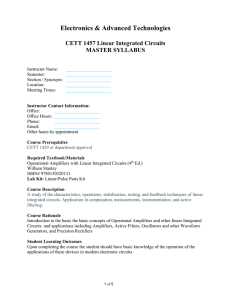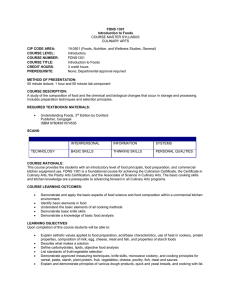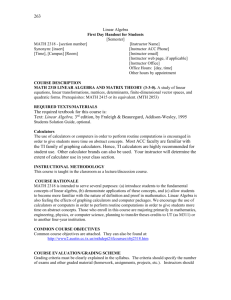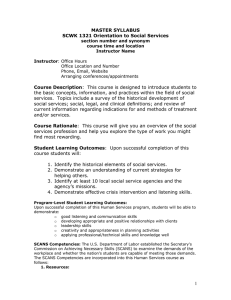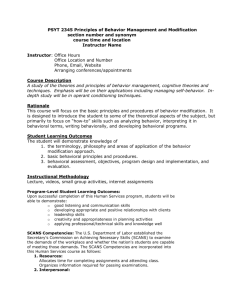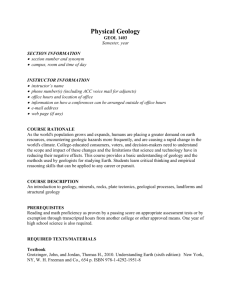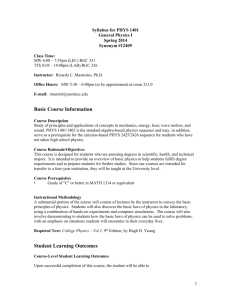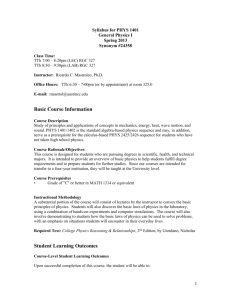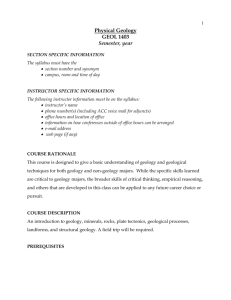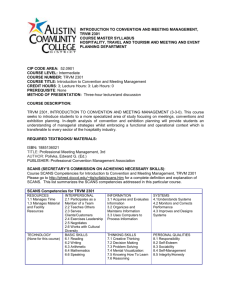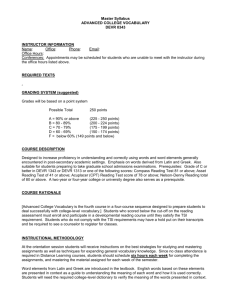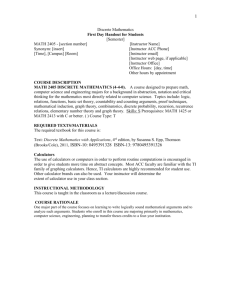Instructor`s Name - Austin Community College
advertisement
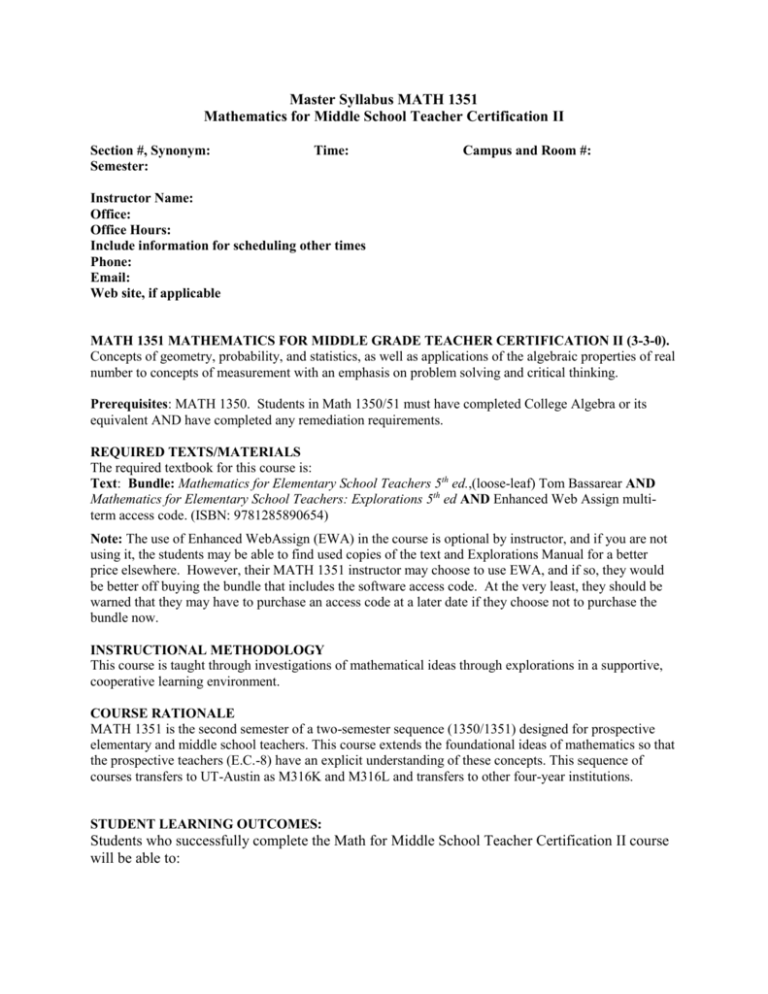
Master Syllabus MATH 1351 Mathematics for Middle School Teacher Certification II Section #, Synonym: Semester: Time: Campus and Room #: Instructor Name: Office: Office Hours: Include information for scheduling other times Phone: Email: Web site, if applicable MATH 1351 MATHEMATICS FOR MIDDLE GRADE TEACHER CERTIFICATION II (3-3-0). Concepts of geometry, probability, and statistics, as well as applications of the algebraic properties of real number to concepts of measurement with an emphasis on problem solving and critical thinking. Prerequisites: MATH 1350. Students in Math 1350/51 must have completed College Algebra or its equivalent AND have completed any remediation requirements. REQUIRED TEXTS/MATERIALS The required textbook for this course is: Text: Bundle: Mathematics for Elementary School Teachers 5th ed.,(loose-leaf) Tom Bassarear AND Mathematics for Elementary School Teachers: Explorations 5th ed AND Enhanced Web Assign multiterm access code. (ISBN: 9781285890654) Note: The use of Enhanced WebAssign (EWA) in the course is optional by instructor, and if you are not using it, the students may be able to find used copies of the text and Explorations Manual for a better price elsewhere. However, their MATH 1351 instructor may choose to use EWA, and if so, they would be better off buying the bundle that includes the software access code. At the very least, they should be warned that they may have to purchase an access code at a later date if they choose not to purchase the bundle now. INSTRUCTIONAL METHODOLOGY This course is taught through investigations of mathematical ideas through explorations in a supportive, cooperative learning environment. COURSE RATIONALE MATH 1351 is the second semester of a two-semester sequence (1350/1351) designed for prospective elementary and middle school teachers. This course extends the foundational ideas of mathematics so that the prospective teachers (E.C.-8) have an explicit understanding of these concepts. This sequence of courses transfers to UT-Austin as M316K and M316L and transfers to other four-year institutions. STUDENT LEARNING OUTCOMES: Students who successfully complete the Math for Middle School Teacher Certification II course will be able to: 1) Organize and display data in a variety of formats (e.g., tables, frequency distributions, stem and leaf plots, box and whisker plots, histograms, pie charts, line graphs) and explain in writing which types of charts are most appropriate in a given situation. 2) Apply concepts of shape, center, spread, and skewness to describe a data distribution. 3) Apply knowledge of counting techniques such as permutations and combinations to quantify and solve problems. 4) Calculate and interpret percentiles and quartiles. 5) Define and explain the basic terms of geometry point, line, plane, angle, polygon 6) Identify and define the classifications of angles, triangles and quadrilaterals 7) Compare and contrast the concepts of perimeter, area, surface area, and volume, and compute them for given shapes and figures 8) Classify and define three dimensional figures such as prisms, pyramids, cylinders and spheres. 9) Perform transformations of shapes through slides, rotations, reflections, and contractions, and identify what transformation or composition of transformations has produced a given image. COMMON COURSE OBJECTIVES MATH 1351 should: a) increase students' explicit understanding (a level of understanding which allows one to clearly and accurately communicate mathematical ideas) of some elementary mathematics: including representation and interpretation of data; concepts of probability; classifying, creating and analyzing two and three dimensional figures; understanding congruence, transformations, symmetry and tessellations; understanding perimeter, area and volume of geometric figures; b) increase students' ability to independently increase their own understanding of mathematics (students need to be able to learn math independently and be confident that they understand it since we can't get to everything they will need to teach elementary or middle school students); c) challenge students' beliefs about mathematics and, hopefully, enhance their attitudes in a positive way; d) provide students with an opportunity to experience mathematics in a constructivist learning environment, as they may be expected to teach it (for further information on that see NCTM's Professional Standards); e) introduce common manipulatives; through use, rather than demonstration, f) begin to develop effective mathematical communication skills. COURSE EVALUATION/GRADING SCHEME: Grading criteria must be clearly explained in the syllabus. The criteria should specify the number of exams and other graded material (homework, assignments, projects, etc.), with percentage allocations. Instructors should discuss the format and administration of exams Guidelines for other graded materials, such as homework or projects, should also be included in the syllabus. Include your policy on Missed Exams, late work, class participation expectations. Incomplete Grade Policy: Incomplete grades (I) will be given only in very rare circumstances. Generally, to receive a grade of "I", a student must have taken all examinations, be passing, and after the last date to withdraw, have a personal tragedy occur which prevents course completion. An incomplete grade cannot be carried beyond the established date in the following semester. The completion date is determined by the instructor but may not be later than the final deadline for withdrawal in the subsequent semester. Attendance/Class Participation: Regular and punctual class attendance is expected of all students.. Much of what you learn will evolve from in-class explorations, experiences and discussions. If attendance or compliance with other course policies is unsatisfactory, the instructor may withdraw students from the class. For attendance, unsatisfactory compliance is usually 4 or more absences, Withdrawal Policy: It is the responsibility of each student to ensure that his or her name is removed from the roll should he or she decide to withdraw from the class. The instructor does, however, reserve the right to drop a student should he or she feel it is necessary. If a student decides to withdraw, he or she should also verify that the withdrawal is submitted before the Final Withdrawal Date (insert date). The student is also strongly encouraged to retain their copy of the withdrawal form for their records. Students who enroll for the third or subsequent time in a course taken since Fall 2002 may be charged a higher tuition rate, for that course. State law permits students to withdraw from no more than six courses during their entire undergraduate career at Texas public colleges or universities. With certain exceptions, all course withdrawals automatically count towards this limit. Details regarding this policy can be found in the ACC college catalog. Statement on Scholastic Dishonesty: A student attending ACC assumes responsibility for conduct compatible with the mission of the college as an educational institution. Students have the responsibility to submit coursework that is the result of their own thought, research, or self-expression. Students must follow all instructions given by faculty or designated college representatives when taking examinations, placement assessments, tests, quizzes, and evaluations. Actions constituting scholastic dishonesty include, but are not limited to, plagiarism, cheating, fabrication, collusion, and falsifying documents. Penalties for scholastic dishonesty will depend upon the nature of the violation and may range from lowering a grade on one assignment to an “F” in the course and/or expulsion from the college. See the Student Standards of Conduct and Disciplinary Process and other policies at http://www.austincc.edu/current/needtoknow Student Rights and Responsibilities: Students at the college have the rights accorded by the U.S. Constitution to freedom of speech, peaceful assembly, petition, and association. These rights carry with them the responsibility to accord the same rights to others in the college community and not to interfere with or disrupt the educational process. Opportunity for students to examine and question pertinent data and assumptions of a given discipline, guided by the evidence of scholarly research, is appropriate in a learning environment. This concept is accompanied by an equally demanding concept of responsibility on the part of the student. As willing partners in learning, students must comply with college rules and procedures. Statement on Students with Disabilities: Each ACC campus offers support services for students with documented disabilities. Students with disabilities who need classroom, academic or other accommodations must request them through Student Accessibility Services (SAS, formerly OSD). Students are encouraged to request accommodations when they register for courses or at least three weeks before the start of the semester, otherwise the provision of accommodations may be delayed. Students who have received approval for accommodations from SAS for this course must provide the instructor with the ‘Notice of Approved Accommodations’ from SAS before accommodations will be provided. Arrangements for academic accommodations can only be made after the instructor receives the ‘Notice of Approved Accommodations’ from the student. Students with approved accommodations are encouraged to submit the ‘Notice of Approved Accommodations’ to the instructor at the beginning of the semester because a reasonable amount of time may be needed to prepare and arrange for the accommodations. Additional information about Student Accessibility Services is available at http://www.austincc.edu/support/osd/ Safety Statement: Austin Community College is committed to providing a safe and healthy environment for study and work. You are expected to learn and comply with ACC environmental, health and safety procedures and agree to follow ACC safety policies. Additional information on these can be found at http://www.austincc.edu/ehs. Because some health and safety circumstances are beyond our control, we ask that you become familiar with the Emergency Procedures poster and Campus Safety Plan map in each classroom. Additional information about emergency procedures and how to sign up for ACC Emergency Alerts to be notified in the event of a serious emergency can be found at: http://www.austincc.edu/emergency/ Please note, you are expected to conduct yourself professionally with respect and courtesy to all. Anyone who thoughtlessly or intentionally jeopardizes the health or safety of another individual will be dismissed from the day’s activity, may be withdrawn from the class, and/or barred from attending future activities. You are expected to conduct yourself professionally with respect and courtesy to all. Anyone who thoughtlessly or intentionally jeopardizes the health or safety of another individual will be immediately dismissed from the day’s activity, may be withdrawn from the class, and/or barred from attending future activities. Use of ACC email: All College e-mail communication to students will be sent solely to the student’s ACCmail account, with the expectation that such communications will be read in a timely fashion. ACC will send important information and will notify you of any college related emergencies using this account. Students should only expect to receive email communication from their instructor using this account. Likewise, students should use their ACCmail account when communicating with instructors and staff. Instructions for activating an ACCmail account can be found at http://www.austincc.edu/accmail/index.php Testing Center Policy: Under certain circumstances, an instructor may have students take an examination in a testing center. Students using the Academic Testing Center must govern themselves according to the Student Guide for Use of ACC Testing Centers and should read the entire guide before going to take the exam. To request an exam, one must have: 1. 1. 2. 3. 4. 5. ACC Photo ID (info at http://www.austincc.edu/support/admissions/student_id.php) Course Abbreviation (e.g., ENGL) Course Number (e.g., 1301) Course Synonym (e.g., 10123) Course Section (e.g., 005) Instructor's Name Do NOT bring cell phones to the Testing Center. Having your cell phone in the testing room, regardless of whether it is on or off, will revoke your testing privileges for the remainder of the semester. ACC Testing Center policies can be found at http://www.austincc.edu/testctr/ Student and Instructional Services: ACC strives to provide exemplary support to its students and offers a broad variety of opportunities and services. Information on these services and support systems is available at http://www.austincc.edu/s4/ Links to many student services and other information can be found at http://www.austincc.edu/current/ ACC Learning Labs provide free tutoring services to all ACC students currently enrolled in the course to be tutored. The tutor schedule for each Learning Lab may be found at: http://www.autincc.edu/tutor/students/tutoring.php For help setting up your ACCeID, ACC Gmail, or ACC Blackboard, see a Learning Lab Technician at any ACC Learning Lab: http://www.austincc.edu/tutor/locations.php COURSE OUTLINE/CALENDAR 16-week Semester Week 11-week Semester Week 1 7.1 1 7.1, 7.2 2 7.2 2 7.3, 7.4 3 7.3 3 7.4, 8.1 4 7.4 4 8.2, 8.3 5 8.1 5 9.1 6 8.2 6 9.2 7 8.2-8.3 7 9.3 8 9.1 8 10.1 9 9.1-9.2 9 10.2 10 9.2,9.3 10 10.3 11 9.3 11 wrap-up, final assessment 12 10.1 13 10.2 14 10.2-10.3 15 10.3 16 wrap-up, final assessment “Please note: schedule changes may occur during the semester. Any changes will be announced in class.”
